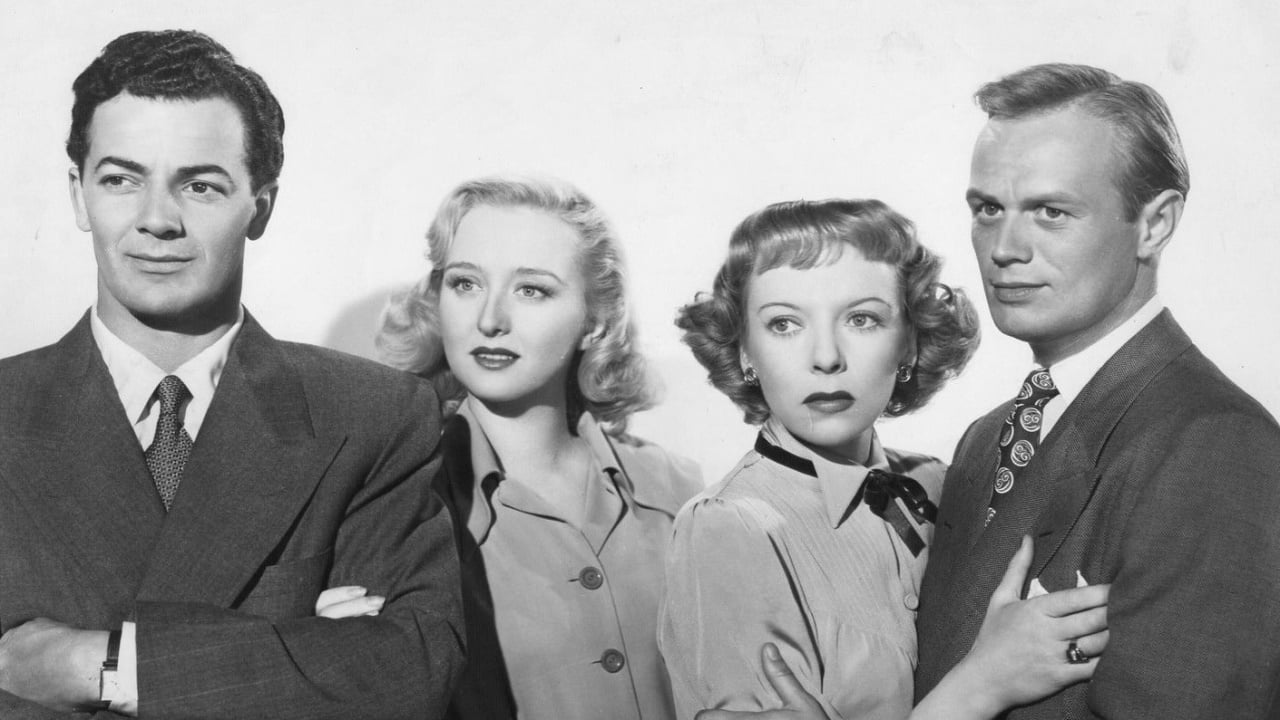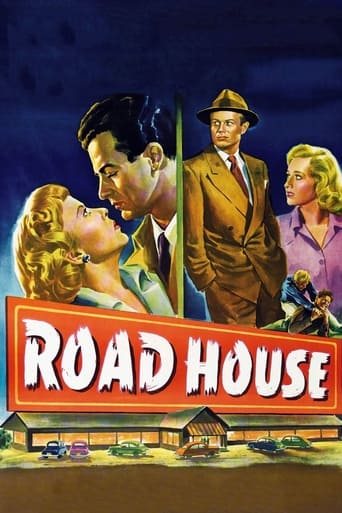

When the Chicago singer Lily Stevens (Ida Lupino) arrives at the Jefty Road House hired by the owner Jefferson T. 'Jefty' Robbins (Richard Widmark), the manager Pete Morgan (Cornel Wilde) gives a cold reception to her. Jefty asks Pete, who is his best friend, to drive Lily to the local hotel. However Pete drives her to the train station instead and asks Lily to go back to Chicago. She refuses to go and her performance is successful in her debut. Soon Pete changes his opinion towards Lily and the accountant and cashier Susie Smith (Celeste Holm) informs that the public has increased not only in the roadhouse, but also in the bowling alley. Jefty feels attraction for Lily, but when he travels, Lily and Pete fall in love with each other. When Jefty returns, he brings a marriage license and proposes Lily; however she dumps him and Pete and she decide to travel to Chicago and leave the town. However Jefty frames Pete and reports a hake theft to the police. Pete is arrested and found guilty by the jury. However Jefty proposes to the judge that Pete continues to work for him instead of going to the prison. What is the intention of Jefty? "Road House" is an engaging film–noir with a storyline of unrequited love and obsession. Ida Lupino has an impressive performance, singing with a wonderful husky voice. The first performance of the famous song "Again" is the soundtrack of "Road Movie" sang by Ida Lupino. This film is also the third appearance of the outstanding Richard Widmark and his insane smile on the cinema. Cornel Wilde and Celeste Holm complete the dream cast of this unknown gem. My vote is eight.Title (Brazil): "A Taverna do Caminho" ("The Tavern on the Way")
... View MoreActually, in real life people rarely are driven nuts by frustration. They go nuts and then they try to find some reason for it. Not that it matters in this case. In 1948 Richard Widmark had a patent on a certain kind of maniac, the kind that giggles as he kills.He begins normally enough. Well, normal for Widmark anyway. He's the impulsive owner of Jefty's Road House near the Canadian border, an undistinguished place with deer heads on the wall. Cornel Wilde is his junior partner and Celeste Holm is the cashier.Widmark brings home a singer, Ida Lupino, whom he picked up on one of his jaunts to the city. He has designs on her. Wilde wants to get rid of her but in fact she turns out to be a terrific success. It's hard to see how because Lupino's voice is neither dubbed nor good. It's full of cracks and sounds smoke cured from years of Chesterfields. Well, okay, nobody ever accused Diana Krall of having an operatic voice and she's not a sex bomb either but Krall can at least play the piano while Lupino's skill is limited to the rudimentary.Come to think of it, everybody smokes in this movie -- a lot. If it were to be remade, nobody would smoke because it's now politically incorrect to show cigarettes in use. Guns -- yes. There'd be blood and brains all over the place in a remake, but no tobacco. First things first.At any rate, Widmark goes away for a week's hunting and guess what happens in his absence? When he returns, he's determined to marry Lupino. He has the marriage license in his pocket. At this point, it's easy to feel sorry for the deluded Widmark character. His friendship with Wilde aside, it's the first sign of maturity that he's shown. Still, it's Wilde's unpleasant duty to tell Widmark that he's out of the picture.Widmark, resignation not being his strong suit, frames Wilde for grand larceny and convinces the judge that Wilde should be paroled to him, Widmark. The judge concurs. I didn't even know you could do that -- I mean that a judge could decide on his own that a convicted man could be turned over to another ordinary citizen as a kind of slave.And a slave is what the sullen Wilde now becomes. He's restored to his earlier position only at a lesser income. He can't slug Widmark. He can't even talk back. And Lupino is tied to Widmark through her love for Wilde. Celeste Holm has the unenviable task of being the good, sensible girl whom nobody wants.Finally, at a cabin in the woods, Widmark goes bananas and after being beaten senseless by Wilde -- he was rude to Lupino -- he grabs a pistol and chases Wilde and Lupino through the forest as they make for the Canadian border. Here the film could have used some location shooting. Studio forests are rarely convincing. There's never any wind, the greenery looks phony and repetitive, and sometimes there are echoes where there should be no echoes. There are instances, though, when studio forests become so stylized as to be -- not convincing -- but at least honest in their falsity. "Battleground" and "Bataan" are examples.Wilde is the nominal hero but he's pretty routine. The character is so straight that he's uninvolving. Lupino's role is more textured. She's had a "past," as they say, and she's a willful and complicated babe. She's skinny and vulnerable but tough enough to belt Wilde when he tries to hustle her out of town with a few bucks. Widmark's character is by far the most interesting. A little unbalanced at the beginning, he turns crafty and bitter before he loses it altogether. There's a good deal of pathos in the character.I don't know if this is a "noir," though it's very dark. A woman comes between two men, but nobody slinks around the city streets and there is no sneaky betrayal by anyone. There's no city at all. The town near which Widmark's road house is located has a population of about 14,000, and we don't see much of it beyond the hotel and the police station. Jean Negulesco's direction is pat. The musical arrangements are by Herbert Spencer, and I thought he'd been dead for years.
... View MoreWhen you're used to Lana Turner in the Postman Always Rings Twice, and compare it to this low budget, low talent, low quality film, well, I was just embarrassed for Ida Lupino's 'singing' (more like talking) and non-piano playing scenes. When the first non-singing scene started and all the people just stared flatly at her, I was positive they were all going to roll their eyes and start leaving or at least talking among themselves (She stinks, c'mon let's get out of here). The actors are flat - emotions are deflated. And Ida is a real spoiled bi-otch throughout - just a 100% turnoff. This was like Betty Boop on conscious sedation meets a gas station attendant in nowhere's ville USA. The story was flat, the music was flat, the acting was flat, her chest was... no never mind. I felt sad for the rest of the actors. Perhaps if the right actress was to have been given the lead role, and the men actors had more emotion, then the film could have had a chance. Sorry for offending those of you who thought it was out of this world. I wouldn't have minded if it stayed out of this world.
... View MoreWhat stands out in ROAD HOUSE, despite the lurid melodramatics of the plot, is RICHARD WIDMARK doing his standard psychopathic job once he discovers his love life has been compromised when IDA LUPINO and CORNEL WILDE fall in love with each other. Widmark takes full advantage of his character's sudden turn from nice guy to a man consumed by cunning jealousy, trapping Wilde into a charge of theft that almost puts the victimized man into prison.Widmark gets the judge to suspend sentence and has Wilde's parole placed under his management. At this point, the plot becomes wildly melodramatic and churns up the heat for the last twenty minutes of explosive emotional fireworks. The fight scenes between Widmark and Wilde are artfully staged and look painfully realistic.Widmark and Lupino dominate the film with forceful work, full of intensity. Wilde is impressively quiet but determined and looks like he'd make a good bouncer at any bar. CELESTE HOLM has more of an onlooker role that does nothing for her career but does about as well as she can with a nothing part.Jean Negulesco has done much better work in other melodramas (notably JOHNNY BELINDA). Here, he directs the film well but lets the melodrama get a bit too overwrought by the time the film winds toward a conclusion. It's not one of his best films.Ida Lupino's husky voice is barely able to wobble through a few good song numbers, which makes her nightclub scenes a little ludicrous. It's one thing to have a throaty voice for standard pop tunes sung in a husky manner, but Lupino's vocals suffer from her one-note monotone delivery.
... View More